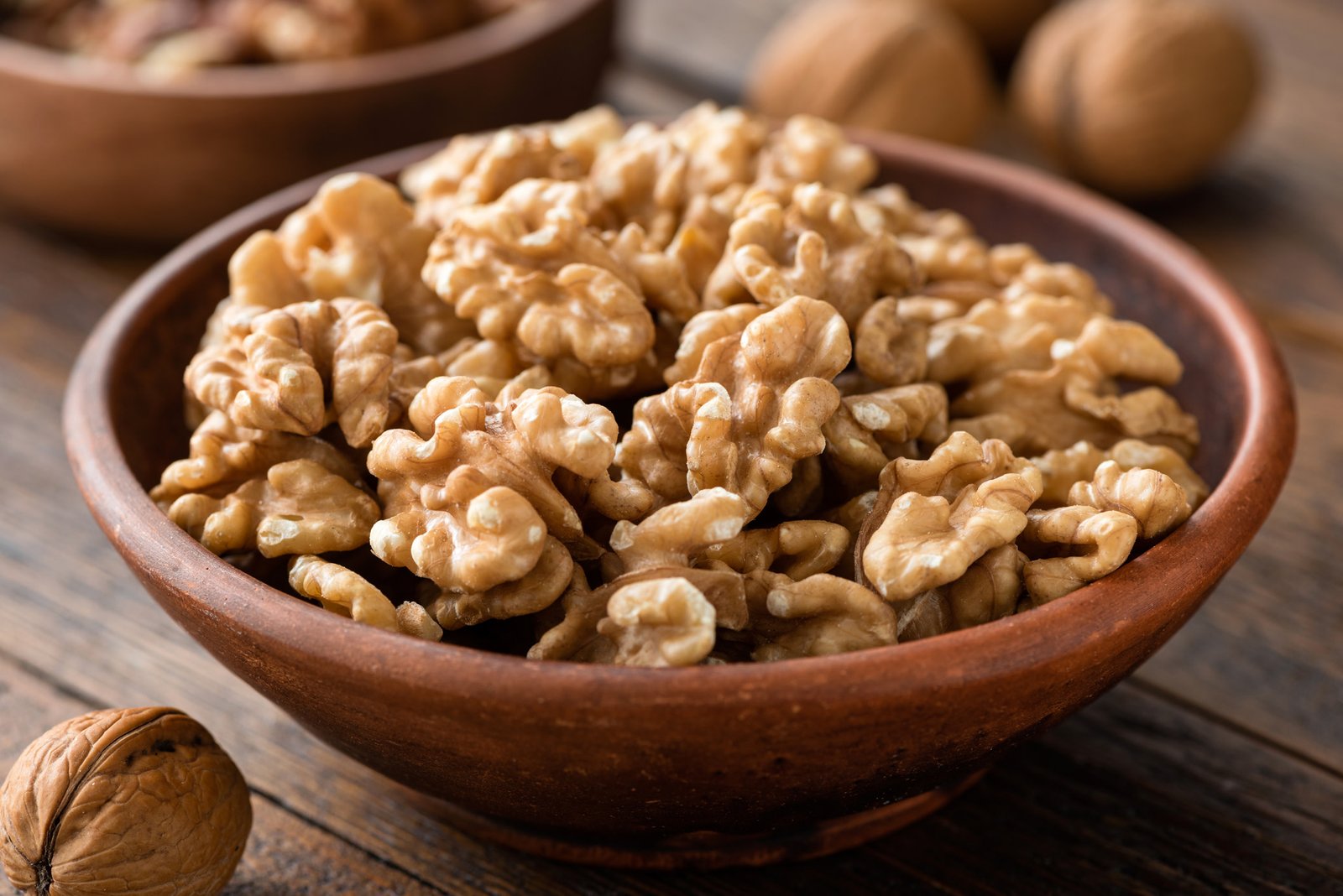Rich in vital elements, including antioxidants and omega-3 fatty acids, there are several health benefits of eating walnuts. It’s also simple to include them in your diet. Calling walnuts nutrient-dense would be an understatement. Just a few of the many ways walnuts may help your health include providing fiber, vitamins, minerals, and healthy fats.
This one nut has generated so much interest that, for the last 50 years, industry professionals and academics have met yearly at the University of California, Davis, for a walnut conference to review the most recent findings in walnut health research. The English walnut (Juglans regia) is the most widely grown and researched kind of walnut.
Reasons To Add Walnuts To Your Diet

1. Nutritional Benefits
Among popular nuts, walnuts have the highest antioxidant activity. Vitamin E, melatonin, and plant substances known as polyphenols—which are present in very high concentrations in the papery skin of walnuts—are the sources of this effect.
A study of healthy people over 60 revealed that consuming a meal high in walnuts lowered the participants’ LDL (bad) cholesterol readings. Atherosclerosis may result from an accumulation of low-density lipoprotein (LDL) cholesterol in the arteries. With 2.5 grams (g) of omega-3 fatty acids per 1-ounce (oz) serving, walnuts have a far greater omega-3 fatty acid content than any other nut.
Walnuts contain an omega-3 fat called alpha-linolenic acid (ALA), an essential fatty acid that must come from food. The Institute of Medicine states that 1.6 g of ALA per day for males and 1.1 g per day for women is a sufficient intake.
2. Provide Healthy Fats
Not all fats are created equal. Monounsaturated and polyunsaturated fats are among the healthful kinds. One of the best foods for getting that healthy polyunsaturated fat is walnuts. ALA, an omega-3 fatty acid in walnuts, helps reduce inflammation.
One of the top health benefits of walnuts is that they are a primary source of ALA. A 10% decreased risk of cardiovascular disease is linked to increasing the quantity of ALA in your diet. In addition to lowering blood pressure, triglycerides, LDL cholesterol, and total cholesterol, ALA may also help prevent diabetes and other illnesses.
3. Promote A Healthy Gut
Studies show that a diverse gut microbiome supports digestive and overall health. An unhealthful gut microbiota composition may raise your risk of obesity, heart disease, and certain cancers by triggering inflammation throughout the body.
Your microbiota’s composition may be greatly influenced by the foods you consume. Consuming walnuts might be one method to promote gut and microbial health. In one study, 194 healthy adults consumed 1.5 oz (43 g) of walnuts daily for eight weeks.
4. Helps In Weight Management
Consuming walnuts might help control your appetite. In a controlled study, participants who drank a smoothie containing 1.75 oz (48 g) of walnuts daily experienced reduced appetite and hunger, according to a well-controlled study of ten adults with obesity who were compared with a calorie-matched placebo group.
Furthermore, after five days of walnut smoothie consumption, brain scans revealed that the individuals’ resistance to extremely alluring food signals, such as cakes and french fries, was strengthened by increased activity in a particular area of the brain.
5. Might Lower Blood Pressure
One of the main risk factors for heart disease and stroke is high blood pressure. The health benefits of eating walnuts may help decrease blood pressure, even in those with high blood pressure, according to research.
Researchers concluded that following a Mediterranean-style diet that includes nuts may help lower blood pressure. This implies that nuts could marginally increase the effects of a heart-healthy diet on blood pressure.
6. Potentially Beneficial For Type 2 Diabetes
Research suggests walnuts may support weight control, which in turn reduces the risk of type 2 diabetes. Maintaining a healthy weight is vital, since extra body fat dramatically raises the chance of getting diabetes and having increased blood sugar levels.
Interestingly, the advantages of walnuts may go beyond weight management. Researchers believe that specific substances in walnuts, such as omega-3 fatty acids, antioxidants, and fiber, may help enhance insulin sensitivity and regulate blood sugar levels.
Furthermore, research revealed that including walnuts within a balanced diet might contribute to minor benefits in blood glucose management. Regular walnut intake, as part of an overall healthy eating pattern, may thus benefit both metabolic health and diabetes prevention.
Read More: 8 Benefits of Mushroom Coffee
7. Encourage Aging In A Healthy Way
Maintaining your mobility and freedom as you age depends on your physical functioning. Healthy eating practices are one item that might assist you in keeping up your physical capabilities. Researchers discovered that women who ate the best diets were 13% less likely to suffer from physical impairment in a study that included over 50,000 women aged 18 and above.
Among the items that contributed most to a healthy diet were walnuts. One of the top health benefits of walnuts is that they are rich in vital vitamins, minerals, fiber, lipids, and plant chemicals that may promote healthy physical performance as you age, despite their relatively high calorie content.
8. Cancer Protection
Early research suggests that walnut intake may influence gene expression in breast tumor cells, potentially slowing disease progression and supporting better outcomes. This genetic effect shows that walnuts may play an important role in suppressing cancer development.
While these results are extremely encouraging, experts underline the need for additional in-depth investigations to completely understand the processes and long-term consequences of walnut consumption in cancer prevention and treatment.
9. Help Brain Function
The fact that a walnut’s shell resembles a miniature brain could simply be a coincidence, but some studies indicate that walnuts may really be beneficial to your mental health. According to some research on both humans and animals, walnuts’ nutrients and antioxidants may help reduce inflammation and oxidative stress by neutralizing free radicals.
Furthermore, human research discovered that incorporating nuts, such as walnuts, in one’s diet was associated with improved mood in people with symptoms of depression.
Wrapping Up
Walnuts are typically recognized as one of the most nutrient-dense nuts available, giving a powerhouse of vitamins, minerals, healthy fats, and plant chemicals that enhance overall well-being. What sets the health benefits of eating walnuts apart from other popular nuts is their very high antioxidant activity and their substantial amount of omega-3 fatty acids, notably alpha-linolenic acid (ALA).
This plant-based omega-3 is crucial for brain health, heart function, and lowering inflammation throughout the body. These advantages make walnuts a good option for anyone wishing to maintain cardiovascular health naturally.
Emerging studies are also discovering remarkable correlations between walnuts and gastrointestinal health. The fiber and plant chemicals in walnuts, such as polyphenols, interact with gut microbiota in ways that may promote a healthy balance of gut bacteria.
Additionally, walnuts contain protein and healthy fats that promote satiety, making them a great snack for weight control. They also include critical micronutrients like magnesium, copper, and vitamin B6, which support everything from bone health to energy generation.
Incorporating walnuts into your everyday diet is easy and diverse. You may sprinkle them over cereal, blend them into smoothies, add them to salads, or eat them as a healthy snack on their own. With their mix of rich taste and profound health benefits, walnuts are more than simply a delightful complement to meals—they’re a nutrient-packed investment in your long-term health and fitness.
FAQ
Q: How many walnuts should you eat daily?
A: According to a study on the impact of walnut intake, eating 30 to 60 grams of walnuts per day is good for heart health. This is equivalent to 1/4 to 1/2 cup, or 1 to 2 ounces, of walnuts.
Q: How may walnuts benefit the brain?
A: When compared to having a comparable calorie-matched breakfast without nuts, researchers at the University of Reading discovered that consuming 50 g of walnuts (a good handful) mixed with muesli and yogurt improved memory function later in the day and accelerated response speeds throughout the day.
Q: Are walnuts beneficial to the lungs?
A: Lung inflammation may be lessened by the anti-inflammatory qualities of omega-3 fatty acids, which are present in walnuts and salmon. You may be able to manage your COPD symptoms by including these foods in your regular diet.











